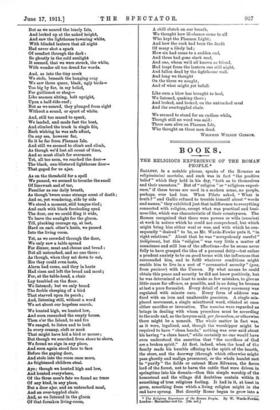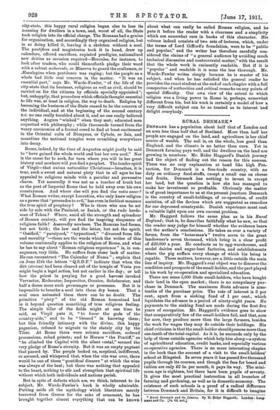BOOKS.
THE RELIGIOUS EXPERIENCE OF THE ROMAN PEOPLE.
SALLUST, in a notable phrase, speaks of the Romans as religiosissina mortales, and such was in fact " the positive belief " which they held in his day, " both as to themselves and their ancestors." But of " religion " or " religious experi- ence," if these terms are used in a modern sense, no people, perhaps, ever had less. When Pilate asked, " What is truth P " and Gallio refused to trouble himself about " words and names," they exhibited just that indifference to everything connected with religion, except what was practical and busi- ness-like, which was characteristic of their countrymen. The Roman recognized that there were powers or wills (nurnina) at work in nature which he could not comprehend, but which might bring him either weal or woe, and with which he con- sequently " desired" to be, as Mr. Warde-Fowler puts it, " in right relations." About that be was "scrupulously careful" (religiosus), but this " religion " was very little a matter of conscience and still less of the affections—for he seems never fully to have grasped the idea of a personal deity—but rather a prudent anxiety to be on good terms with the influences that surrounded him, and to fulfil whatever conditions might enable him to live in a sort of "covenanted security" (pax, from paciscor) with the Unseen. By what means he could obtain this peace and security he did not know positively, but he was determined at least to make as few mistakes, to give as little cause for offence, as possible, and in so doing he became at last a pure formalist. Every detail of every ceremony was regulated with minute care. Every form of address was fixed with an iron and unalterable precision. A single mis- placed movement, a single misuttered word, vitiated at once either sacrifice or invocation. The numina were regarded as beings in dealing with whom procedure must be according to the code and, as the lawyers said, per formulam, or otherwise there might be a nonsuit. The whole matter in fact was, as it were, legalized, and, though the worshipper might be required to have " clean hands," nothing was ever said about his having " a clean heart," while certainly no one would have even understood the assertion that "the sacrifices of God are a broken spirit." At first, indeed, when the head of the family made his humble offering to the spirit of the hearth, the store, and the doorway (through which otherwise might pass ghostly and malign presences), or the whole hamlet met to " purify " the fields or entreat Mars Silvanus, the fierce lord of the forest, not to harm the cattle that were driven in springtime into his domain—then this simple worship of the homestead and the village did doubtless contain within it something of true religious feeling. It had in it, at least in germ, something from which a living religion might in the end have sprung. But directly Rome began to grow into a • The Religious Bxperience of the Roman People. By W. Warcle-rowlei. London : Macmillan and Co. [12a. net.)
city-state, this happy rural religion began also to lose its meaning for dwellers in a town, and, worst of all, the State took religion into its official charge. The Romans had a genius for organization, and accordingly they organized religion, but in so doing killed it, leaving it a skeleton without a soul. The pontiftces and magistrates took it in hand, drew up calendars, offered sacrifices, expiated prodigies, nationalized new deities as occasion required—Hercules, for instance, to look after traders, who could thenceforth pledge their word with a robust inehercule, or Minerva to guard the craftsmen, or isculapius when pestilence was raging ; but the people as a whole had little real concern in the matter. " It was an essential part," says Mr. Warde-Fowler, " of the life of the city-state that its business, religious as well as civil, should be carried on for the citizens by officials specially appointed"; but, unhappily, that procedure which officials thought essential to life was, at least in religion, the way to death. Religion by becoming the business of the State ceased to be the concern of the individual, and at the beginning of the second century B.C. no one really troubled about it, and no one really believed anything. Augurs " winked " when they met; educated men coquetted with philosophy ; while thousands turned from the weary ceremonies of a formal creed to find at least excitement in the Oriental cults of Dionysus, or Cybele, or Isis, and meantime the national temples were crumbling everywhere into decay.
Rome, indeed, by the time of Augustus might justly be said to " have gained the whole world and lost her own soul." Nor is the cause far to seek, for turn where you will in her great history and nowhere will you find a prophet. The tender spirit of Virgil—that anima naturaliter Christiana—breathes, it is true, such a sweet and natural piety that in all ages he has appealed to religious minds with a peculiar and persuasive charm. Yet assuredly it was not as a teacher of truth but as the poet of Imperial Rome that lie held sway over his own countrymen. And where else will you find the vales sacer? What Roman writer, except Lucretius, who only knew religion as a power that "persuades to evil," has even in feeblest measure the true spirit of prophecy ? Who is there who can be set side by side with the Psalmist, or Isaiah, or the rude herds- man of Tekoa ? Where, amid all the strength and splendour of Roman oratory, will you find the inspiring eloquence of religious faith ? Assuredly nowhere. The Romans had forms, but not faith ; the law and the letter, but not the spirit. " Ossified," " paralyzed," " hypnotized," " divorced from life and morality "—these are the words which the writer of this volume continually applies to the religion of Rome, and what he has to say about " Roman religious experience " is, in con- sequence, very little. He suffers from sheer lack of matter. He can reconstruct " The Calendar of Numa " ; explain that on June 15th the letters " Q.S.D.F." indicate that when the dirt (sterols) had been cleared out of the temple of Vesta you might begin a legal action, but not earlier in the day ; or tell how the priest in praying for a good harvest invoked Vervactor, Redarator, Imporcitor, Occator, Subrincator, and half a dozen more such personages or processes. But it is impossible to breathe a soul into these dry bones. That a soul once animated them there can be no doubt. The primitive " piety " of the old Roman homestead had in it beyond question something of true religious feeling. The simple tiller of the fields might at one time be said, as Virgil puts it, " to know the gods of the country-side," and to be " blessed " in knowing them ; but this friendly intimacy with the divine, this happy paganism, refused to migrate to the stately city by the Tiber. At Rome there were solemn sacrifices, ordered processions, robed priests ; and to Horace " the Pontiff," as " he climbed the Capitol with the silentvestal," seemed the very pledge of Rome's eternity. But it was an empty pageant that passed by. The people looked on, sceptical, indifferent, or amused, and whispered that, when the rite was over, there would be one of those " pontifical dinners " at which the wine was always of the best; but there was nothing that appealed to the heart, nothing to stir and strengthen that spiritual life without which both individuals and nations perish.
But in spite of defects which are, we think, inherent to its subject, Mr. Warde-Fowler's book is wholly admirable. Putting aside all the mythology which literature merely borrowed from Greece for the sake of ornament, he has brought together almost everything that can be }:flown about what can really be called Roman religion, and he puts it before the reader with a clearness and a simplicity which are somewhat rare in books of this character. His volume indeed consists of two sets of lectures, which, under the terms of Lord Gifford's foundation, were to be " public and popular," and the writer has therefore carefully con- sidered the claims of " a general audience by avoiding much technical discussion and controversial matter," with the result that the whole work is eminently readable. But if it is "popular'' and readable it is none the less thorough. Mr. Warde-Fowler writes simply because he is master of his subject, and when he has satisfied the general reader ho provides the exact student at the end of each chapter with a full conspectus of authorities and critical remarks on any points of special difficulty. Our own view of the extent to which religion was a living power in Rome is, perhaps, somewhat different from his, but his work is certainly a model of how a very difficult subject can be so treated as to interest 'and delight everybody.











































 Previous page
Previous page